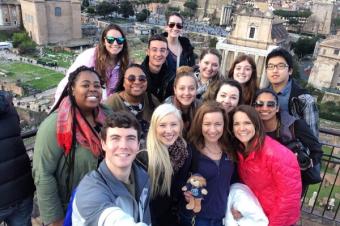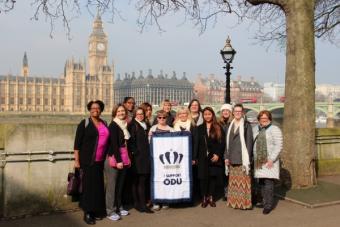Our top priority and primary concern is students' health and safety abroad. We take our health and safety preparations for students very seriously throughout the pre-departure process and remain available to students while they are abroad.
We also provide extensive resources and maintain contact with our host university colleagues and affiliated program providers abroad. Students will have on-site staff support during their program, as well as our 24-hour emergency number for ODU campus police.
Staff in ODU's Office of Study Abroad monitor updates on health and safety issues around the world that are issued by the U.S. Department of State and the Overseas Security Advisory Council. Due to security concerns, programs may be canceled.
Even though most students do not encounter safety issues abroad, it is essential for each student to be prepared to avoid the risk of serious situations.
To contact us in an emergency call (757) 683-4000 (ODU Campus Police).
It is the responsibility of each student to disclose medical history and health concerns to the Office of Study Abroad and on-site staff so that we can adequately prepare him/her for a successful study abroad experience and discuss any potential health risks. For any students who are taking medications or have health concerns, our advisors will arrange a time to meet individually and discuss the steps to take to ensure you have enough medication for the duration of your time abroad and have contact information for medical care providers in your host community.
Students should also review health and safety information for their respective programs. Reliable sources of information include the Center for Disease Control (CDC) and the US Department of State.
Health Resources
- International Association for Medical Assistance to Travelers (IAMAT)
- SAFETI Clearinghouse (Safety Abroad First - Educational Travel Information)
- Maintaining Strong Mental and Emotional Health (SAFETI)
- Trip Prep
- US DHHS Centers for Disease Control and Prevention
- World Health Organization
- MIUSA: Mental Health Tip Sheet
- MIUSA: Personal mental health accounts from abroad
For students who disclose that they have special needs, our advisors will arrange a time to meet individually and discuss the steps to prepare for a successful study abroad experience. Our advisors will assist you in researching what accommodations can or cannot be made for you in your program and country of interest. Please click on the Access & Inclusion tab on this page for more information.
Please contact the Office of Study Abroad if you have any questions or concerns about your health and/or safety while abroad.
Old Dominion University policy #5101 requires that all participants in international education programs — whether of credit or non-credit nature — have international insurance coverage for the duration of their program.
In order to comply with this policy, all students participating in a study abroad program are required to purchase ODU's designated policy for the duration of their official program/term dates, which are set by the host institution or affiliated program. Students will be enrolled in this policy based on the published program dates for their term abroad and will be provided with their insurance information prior to departure.
We encourage students to research current safety warnings and issues, and stay up-to-date on current events in the host country before departure and while abroad. We also recommend that students discuss safety strategies for unexpected events and emergencies abroad with on-site program staff. ODU staff will also be available to provide assistance.
Some preventative measures you can take include:
- Be aware of your surroundings
- Know what locations and what times of day are safe/unsafe in your host community
- Travel in pairs or groups whenever possible
- Know who to contact in the event of an emergency
- Avoid exposing valuables or leaving them unattended
- Follow your instincts and remove yourself from any potentially unsafe situations
The Department of State has prepared a list of emergency contacts for each country. See the links below:
Safety Resources
- Center for Disease Control and Prevention (CDC)
- Health Information for International Travel (The Yellow Book)
- Overseas Security Advisory Council (OSAC) Crime and Safety Reports
- School for International Training (SIT)'s Health and Safety Information
- Resources on Sexual Assault in Japan
- CIEE's Health and Safety Information
- The International Association for Medical Assistance to Travelers: directory of English-speaking doctors across 120 countries
- The Paperboy Online Newspaper Guide: online newspapers around the world.
- Travel Health Online
- U.S. Department of State Travel Registration
- U.S. Department of State Travel Advisories and Country Information Pages: provides locations of the U.S. Embassies/Consulates, immigration practices, health conditions, political disturbances, currency and entry regulations, crime and security information, and drug penalties for every country in the world
- World Health Organization
- European Road Signs and Conventions
What if I have an emergency while I am abroad?
In the event of a life-threatening emergency, contact local emergency officials first. The State Department provides a list of the 911 equivalents around the world. Make note of the emergency number for your host country and keep it and on-site program numbers with you at all times and/or in your cell phone abroad.
If you experience a non-life threatening emergency, notify your on-site program contact first. On-site staff are in the best position to provide immediate assistance, whether that be accompanying you to the doctor, filing a police report, or helping you replace a lost passport.
What happens in the event of a natural disaster, terrorist attack, political or social unrest, or threat of war in my host country?
Your safety and security is of utmost concern. ODU study abroad staff regularly monitors US State Department Travel Advisories, the Overseas Security Advisory Council information, updates from our partners abroad, and alerts from our health insurance/evacuation provider about unrest or threats that could jeopardize your safety abroad. We recommend all students studying abroad enroll in safety updates from multiple sources. In the rare event that ODU or ODU partner decides to cancel a program, students will be evacuated from their program site.
Will I have health insurance coverage while I am studying abroad?
Yes, Old Dominion University policy #5101 requires that all participants in international education programs — whether of a credit or non-credit nature — have international insurance coverage for the duration of their program.
In order to comply with this policy, all students participating in a study abroad program are required to purchase ODU's designated policy for the duration of their official program/term dates which are set by the host institution or affiliated program. Students will be enrolled in this policy based on the published program dates for their term abroad and will be provided with their insurance information prior to departure.
The cost is included in the program fee for Faculty-Led programs and is a separate payment for students studying on exchange or affiliated programs. Insurance costs vary and are dependent on program duration. The policy provides benefits that your personal coverage often does not. Most health and accident incidents will be covered in your host country and in other countries you may travel to. For a summary of coverage, please read the CISI Coverage Plan. Preventive care and dangerous activities (i.e. skydiving and bungee jumping) are not covered.
Note that this policy is not travel insurance. ODU does not provide travel insurance and does not require that students purchase it. However, travel plans can change unexpectedly, luggage can be lost during travel, and damage to personal property can occur. If you would like to insure your travel or your belongings, you may purchase travel insurance through a travel agency or online.
Can I opt out of the ODU Study Abroad health insurance?
Old Dominion University policy #5101 requires that all participants in international education programs -- whether of a credit or non-credit nature -- have international insurance coverage for the duration of their program that meets the stated criteria in policy #5101.
How does the health insurance work?
Students will purchase ODU's designated insurance policy for the duration of their official program/term dates, which are set by the host institution or affiliated program. Students will be enrolled in this policy based on the published program dates for their term abroad and will be provided with their insurance information prior to departure. If you need to use the health insurance for an illness or emergency, you should notify your on-site program contact for immediate assistance. Typically, students can either present their insurance cards at the time of service or will pay the medical costs up front, and then file a claim through CISI for reimbursement. Claim forms are available on their website.
Should I purchase travel insurance when I go abroad? ODU does not provide travel insurance and does not require that students purchase it. However, travel plans can change unexpectedly, luggage can be lost during travel, and damage to personal property can occur. If you would like to insure your travel or your belongings, you may purchase travel insurance through a travel agency or online.
Can I bring prescription medications with me abroad?
It depends on the medication and the country you are traveling to. We suggest that you refer to the U.S. Department of State's Health Information for Americans Abroad page, which provides tips for traveling with prescription medication. Our advisors will arrange a time to meet individually with you to discuss the steps to take to ensure you have enough medication for the duration of your time abroad. Our insurance provider will then assist us with determining whether or not your prescription medication is legal and available in your host country.
What immunizations are recommended for my host country and other places I might travel to?
Refer to the Center for Disease Control website for recommended immunizations for your host country and each country you plan on traveling to while abroad. You may need several shots taken at various times over several weeks, so plan ahead.
How can I stay informed about events (demonstrations/riots, airport closures, natural disasters, etc.) that might affect my travel plans abroad?
We suggest the following resources for staying up-to-date on current events while abroad:
One of the most profound ways to experience academic, professional, and personal growth while at ODU is through Study Abroad. We advocate making Study Abroad a reality for ODU's diverse student body.
We encourage you to explore the following resources, speak with your ODU study abroad advisor, and ask about getting in contact with study abroad alumni.
You likely already possess intercultural navigation skills that will be a major benefit to you while studying abroad, so start planning your next adventure today!
While one of the most transformative experiences a student can have, the challenges associated with studying abroad are not to be underestimated. Transitional challenges are especially unique for students with disabilities, but so are the opportunities for growth. Studying abroad can help improve confidence and independence, increase valuable skills to benefit your future career, and dispel your own stereotypes and those of others.
Sometimes previous experiences associated with belonging to an underrepresented group, may cause students with disabilities to feel more prepared to face these new and different challenges. With appropriate preparation, both students and their host communities can benefit greatly from the study abroad experience.
The perception of various levels of ability and the accommodations made to such levels differs in each country around the world. Because of this, it is essential to begin preparations now by doing the following:
- Inform your study abroad advisor of your specific needs as soon as possible to make sure that the program is right for you and to allow ample time to consider what accommodations are available.
- Learn about what types of accommodation are commonly provided in your host country, and expect there to be differences in the support that is offered. Prepare to be flexible and open to different types of access and perceptions of disability.
- Research the cultural aspects regarding individuals with disabilities in the country(ies) you are considering traveling to.
- Prepare ahead of time: Read, communicate with other students, and attend the required pre-departure orientation sessions. The more you know, the better prepared you will be for the interaction between your disability and your host community.
- Meet with your medical care provider and work him/her/them to obtain a sufficient amount of medication to last your entire stay abroad.
- Consider how you will discuss or answer questions about your disability in the language of your host country -- learn key words before departure.
- Keep an open mind and continue learning while you are abroad by talking with your new friends, host family, site director, professors, etc.
Ask Questions!
To help you prepare to study abroad, here are some questions to consider asking:
- What are the physical environments like in the host country? What are the housing and transportation options?
- What is the course structure like? Is teaching done through lectures, readings, or is independent research required? In what ways are assignments different?
- Are tasks like cooking and laundry the responsibility of the students?
- What resources will be available if support is needed?
- Will it be possible to take part in any excursions offered by the program?
Our advisors will assist you in researching what accommodations can or cannot be made for you in your program and country of interest.
Helpful Resources
- ODU Office of Educational Accessibility
- Abroad With Disabilities (AWD): a non-profit organization that encourages people with disabilities to go abroad.
- Disability Rights and Education Defense Fund: advocates disability civil rights, and provides a list of international disability laws by country
- Mobility International USA (MIUSA): empowers people with disabilities through international exchange, information, technical assistance, and training, to ensure an inclusive community where people with disabilities are respected and celebrated.
- Mobility International's Podcast: an insightful look into studying abroad with a disability
- National Clearing House on Disability & Exchange: a resource for people with disabilities interested in studying, working, interning, volunteering, researching, or teaching abroad programs. Stories from Study Abroad participants are sorted by region or disability.
- U.S. Department of State
- Transitions Abroad: Disability Travel
- US Department of State: Human Rights Reports
- The U.S. State Department: resources for Americans with disabilities who travel abroad
- Disability Travel Resources
- European Agency for Special Needs and Inclusion Education
- IFSA Butler - Unpacked - A Study Abroad Guide for Students Like Me
- Diversity Abroad Students with Disabilities Abroad
You have made a major accomplishment by getting to ODU, gaining the necessary skills to navigate the higher education system, and adjusting to life on campus. As a first generation college student, you are likely the first person in your family to make these achievements. Now you have the wonderful opportunity to be the first in your family to study abroad during your college career. We know you probably have a lot of questions and concerns, so the Office of Study Abroad is happy to help you get started and navigate the study abroad process!
Did you know?
- There are study abroad programs that range from a week in duration up to an entire academic year.
- There are programs that are comparable in price to what it costs to attend ODU.
- Students can use financial aid on approved ODU programs, and can apply for study abroad scholarships.
- Our office will help you find a program that can fulfill your degree requirements - including major and minor coursework - so you can still graduate on time.
Benefits to Study Abroad
- Employers value the skills students acquire through education abroad opportunities. Students who have studied abroad demonstrate the ability to communicate effectively to diverse populations, adapt to various situations and cultures, be flexible in the workplace, and have advanced problem-solving skills. Including a study abroad experience on your resume can help you stand out in a competitive job market.
- The transformational growth you will experience through studying abroad is irreplaceable. You will notice that you have the confidence to achieve the goals you set out to accomplish.
- Learning from new people in new places allows you to view situations from different perspectives. Students often find that they want to get more involved in their home communities after they return, and many others find that they want to be more involved on a global scale, often finding opportunities to return abroad after graduation.
- It's fun! You will have the opportunity to explore a different country, try new experiences, and meet people from all over the world while working on your degree from ODU.
Helpful Resources
- First-Generation @ ODU
- All Abroad: a resource for funding advice, and general study abroad advice for first-generation students
- Diversity Abroad: tips on how to best prepare for studying abroad, advice for first-generation students, scholarship opportunities, and student testimonials
- First in the Family: tips, videos, facts, and inspiring words from first-generation students
- First Abroad Stories: Misael Aguilar Orellana
The Office of Study Abroad at Old Dominion University welcomes all gender and sexual identities, and encourages these students to explore the world and share their stories. Informing a study abroad advisor about your LGBTQIA+ identity will help us support you throughout the entire study abroad experience.
There are people all over the world that identify with the LGBTQIA+ (lesbian, gay, bisexual, transgender, queer/questioning, intersex, asexual) community. Every day, these people are figuring out ways to navigate the laws, regulations, and oppressions of their communities. Compared to the U.S., coming out in other parts of the world is very different. Some countries celebrate LGBTQIA+ identities; in others, people can be imprisoned for their identity.
Many countries are more accepting of the LGBTQIA+ community than the U.S. While participating in a study abroad program in one of these countries, students may discover a new perspective and enhanced self-comfort with their identity. Students who identify with the LGBTQIA+ community may even notice that they are better prepared for cultural challenges abroad because the "minority" or "outsider" perspective may already be familiar.
Degrees of support, acceptance and tolerance, however, differ from country to country. LGBTQIA+ students will find that educating themselves on the legal and cultural factors facing LGBTQIA+ people in their host community before departure will make their experience more enjoyable and successful.
Resources
- NAFSA: Association of International Educators Rainbow Special Interest Group: comprehensive information for LGBTQ students interested in studying abroad
- ODU Lesbian, Gay, Bisexual, Transgender Initiative
- International Gay and Lesbian Human Rights Commission
- International Lesbian and Gay Association: a global federation dedicated to achieving equal rights for lesbian, gay, bisexual and transgendered people; provides a country-by-country world survey of the legal position of and attitudes toward LGBT people
- Diversity Abroad: provides notes on specific countries, alumni stories, and scholarship opportunities
- Out Traveler: city guides for LGBTQ travelers
- US. Dept. of State LGBT Travel Information
- Major Life Lessons I Learned Studying Abroad as an LGBT Student
- NPR - Know an LGBTQ Student Itching to Study Abroad? Here are Some Things To Think About
- LGBT Guide to Study Abroad
- Legal Status of Same-Sex Relationships Around the World
- LGBTQI+ Returned Peace Corps Volunteers
- IFSA Butler - Unpacked - A Study Abroad Guide for Students Like Me
Trans-Specific Resources
- Know Your Rights / Airport Security
- A Trans-Guide to "When traveling, what should you do?"
- Passport Gender Change Policy
- The Global Divide on Homosexuality
Please note:
For emergency assistance, while you are abroad, the closest U.S. embassy or consulate is available to assist you. Don't be afraid to contact them as they will not pass judgment and will protect your privacy.
We look forward to helping you turn your dreams of studying abroad into a reality. See how you can get started with the planning process here!
Importance of Study Abroad
The Office of Study Abroad is dedicated to sending student ambassadors around the world who reflect the United States' medley of diversity. We believe your personal story should be shared with people from all over the world. You may even help to dispel stereotypes that exist in other countries along the way. The transformational experience that you will gain through study abroad is irreplaceable. Upon your return home, you can expect to have the confidence to succeed in most any situation.
Preparing to go
Racial concerns vary from country-to-country. Sometimes students' racial identities are the minority in their home communities, but find that their race is the majority in the country where they study abroad. Conversely, for the first time in their lives, some students may experience being a racial minority in their host country. Often times, students discover that their nationalities turn out to be more of an issue of concern than their racial background (i.e. abroad you may be identified first as a U.S.-American).
Regardless of the circumstances, students should reflect on their own experiences surrounding race as well as their own biases and assumptions. Cultures around the world have varying ways of handling racial issues. Students may come across people who are excessively curious of their race to totally neutral or standoffish. Before studying abroad, research the ways your host culture differs from the U.S. in the ways it navigates racial issues. By increasing your awareness through pre-departure preparations, you will be will be less likely to have a negative experience if you find yourself in a confusing situation abroad.
Resources
AFRICAN-AMERICAN STUDENTS
- 10 Reasons for African American Students to Study Abroad
- Six Things I Wish I Knew Before I Studied Abroad
ASIAN / PACIFIC ISLANDER STUDENTS
HISPANIC & LATIN AMERICAN STUDENTS
- 10 Reasons for Hispanic American Students to Study Abroad
- Hispanic College Fund: scholarships available
NATIVE AMERICAN STUDENTS
ADDITIONAL RESOURCES
- ODU Office of Equity, Accessibility & Diversity
- ODU Office of Intercultural Relations
- Changing the Face of Study Abroad
- Diversity Abroad Pre-departure Video: Identity and Study Abroad
- Minority Students Abroad: an Inspiring Experience
- PLATO: Project for Learning Abroad, Training & Outreach
- IFSA Butler - Unpacked - A Study Abroad Guide for Students Like Me
- Diversity Issues in Study Abroad: student quotes about their experiences abroad addressing issues of diversity
- On She Goes: A digital travel magazine for, and by women of color
- AllAbroad.us: advocates for increased diversity in study abroad includes information for students, parents and faculty/staff. Has a "Mentor" section with video clips, and scholarship opportunities.
- Scholarships for Students of Color, International Studies & Programs, Michigan State University: see the "External Scholarships" section
- Reflections of being a Fulbright Recipient of Color: Fulbright alumni talk about their experiences as people of color in South Korea
- Studying in the Rainbow Nation- A minority student perspective
- Race Culture and Ethnicity in South America
- Fulbright Noir: Black Fulbright Grantees and Alumni
- Culture and Diversity Travel Guide to Japan
Please contact a study abroad advisor with any questions, concerns, you may have. If financing education abroad is a concern, speak with an advisor. Many programs offer scholarships specifically for underrepresented students.
We look forward to meeting with you to discuss your goals and study abroad plans. Click here for your next steps!
- Cost of Living Comparison
- Earth Calendar (Holidays Around the World)
- Language Learning Resources
- XE Universal Currency Converter
- Physical Maps, Political Maps, Facts and Statistics on Countries of the World
- World Citizens Guide
- US Passports
- US Travel Warnings
- US Department of State: Study Abroad: Select Country for Visa Requirements
- Association for Safe International Road Travel
- CIA World Factbook
- Country Profiles (Visa Information)
- Country Specific Information
- DOS Smart Traveler Enrollment Program
- Rome2Rio
- Student Flights
- US Department of State Students Abroad
- US Embassies Abroad: Select Country for Host Country specific US Embassies
The Office of Study Abroad can help you make studying abroad a feasible reality. With research and careful planning, an international experience doesn't have to be a financial burden. Important factors to consider when planning your experience are program type, location, term abroad, and the local cost of living.
In addition to choosing an appropriate program, ODU students have access to a number of financial resources to help fund their study abroad experience.




